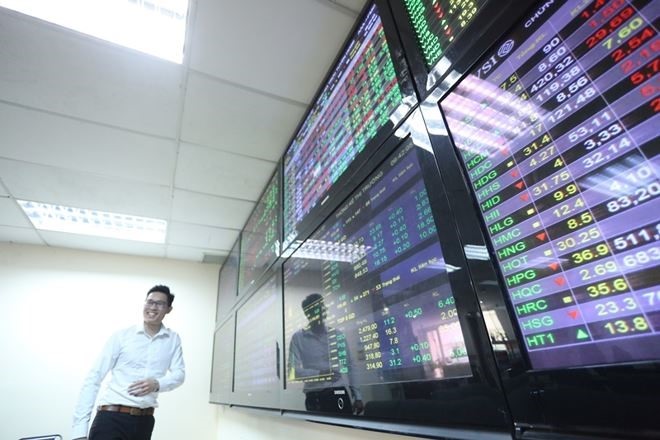Bottom purchase demand increased towards the end of Thursday’s trading session while selling pressure lessened, helping narrow the market’s downward trend significantly.

Bottom purchase demand increased towards the end of Thursday’s trading session while selling pressure lessened, helping narrow the market’s downward trend significantly.
The VN-Index on the HCM Stock Exchange declined 1.36 per cent to 910.17 points by the end of the afternoon’s trade, marking a six-day fall of 6.3 per cent.
The benchmark index lost 2.45 per cent to 900.11 points by the end of morning trading.
On the Ha Noi Stock Exchange, the HNX-Index lost 0.61 per cent to end at 103.10 points.
The index lost 1.27 per cent to end at 103.73 points on Wednesday.
Market liquidity increased compared to yesterday but remained at an average level with total 228 million shares worth nearly VND5 trillion (US$213.7 million) traded on the two markets.
Declining stocks dominated the market with 314 stocks seeing prices fall, while 126 others ended on a positive note.
Large-cap stocks underperformed as the VN30 Index, tracking the performance of the 30 largest stocks by market capitalisation, inched down 0.85 per cent to close Thursday at 888.86 points.
Although investors are still cautious amid fears on the market’s downtrend, short-term bottom-fishing demand strongly supported the market on Thursday.
Bottom-fishing helped some large-cap stocks gain ground, supporting the indices such as Vicostone JSC (VCS), Vietnam Construction and Import-Export Joint Stock Corporation (VCG), PetroVietnam Technical Services Corporation (PVS), real estate developer Novaland (NVL) and Masan Group (MSN).
Conversely, Vinhomes (VHM), Viet Capital Securities Joint Stock Company (VCI), Tien Phong Plastic Joint Stock Company (NTP), Mobile World Group (MWG), Bank for Investment and Development of Vietnam (BID) still fell deeply and contributed to the pressure on the general market.
World stocks slumped on Wednesday, affecting investors’ confidence in the Vietnamese market. The Dow Jones Industrial Average fell 2.41 per cent.
According to Bao Viet Securities Company, there were certain reasons for the plunge on the US stock market recently. Although 80 per cent of listed companies reported solid business results beyond expectation, their CEOs have been concerned about maintaining their profits as rising production and materials costs (an inevitable consequence of the US-China trade war) can result in a drop of profit margins.
The Fed has raised interest rates and is expected to hike them one more time in December, three times in 2019 and once in 2020. Consequently, companies and investors have faced challenges from rising financial expenses.
Several factors have conspired to knock markets, including the conflict between Italy and the European Union over budget spending, as well as the killing of Saudi journalist Jamal Khashoggi.
“From now until the US midterm elections on November 6 (after Q3 earnings result season), there will be no significant changes in policies and the US stock market will move at a slower pace in a narrower range after days of strong volatility,” BVSC said in its daily report.
In Viet Nam, world stocks and foreign investors remaining net sellers over the past three weeks, especially in blue-chips, have had significant influence on the stock market.
So far, more than 260 companies have released their business results, showing higher profit compared to the same period in 2017. However, solid results no longer affect investors’ sentiment as these results have been reported amid the market’s correction and are in line with forecasts and reflected in recent prices, BVSC said.
The market would see a gap in news from now until early December, after Q3 earnings results are released. In early December, short-term factors affecting each specific share such as the inclusion or removal of stocks in the VN30 list and the review of the ETFs will be a highlight.
The UPCOM Index on the Unlisted Public Company Market (UPCoM) lost 0.43 per cent to finish at 51.29 points. The unlisted market index edged down 1.04 per cent to finish at 51.51 points in the previous session. — VNS





